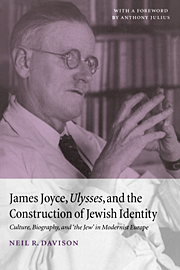 James Joyce, Ulysses, and the Construction of Jewish Identity
James Joyce, Ulysses, and the Construction of Jewish Identity Book contents
- Frontmatter
- Contents
- Foreword by Anthony Julius
- Acknowledgements
- List of abbreviations
- Introduction
- 1 Silence: family values
- 2 Silence: Jesuit years – Clongowes and Belvedere
- 3 Silence: university years – the Church, Dreyfus, and aesthetics
- 4 Exile: excursion to the Continent, bitter return
- 5 Cunning and exile: Greeks and Jews
- 6 Cunning: Jews and the Continent – texts and subtexts
- 7 Cunning: the miracle of Lazarus times two – Joyce and Italo Svevo
- 8 Ulysses
- Conclusion
- Notes
- Select bibliography
- Index
5 - Cunning and exile: Greeks and Jews
Published online by Cambridge University Press: 05 April 2012
- Frontmatter
- Contents
- Foreword by Anthony Julius
- Acknowledgements
- List of abbreviations
- Introduction
- 1 Silence: family values
- 2 Silence: Jesuit years – Clongowes and Belvedere
- 3 Silence: university years – the Church, Dreyfus, and aesthetics
- 4 Exile: excursion to the Continent, bitter return
- 5 Cunning and exile: Greeks and Jews
- 6 Cunning: Jews and the Continent – texts and subtexts
- 7 Cunning: the miracle of Lazarus times two – Joyce and Italo Svevo
- 8 Ulysses
- Conclusion
- Notes
- Select bibliography
- Index
Summary
The concept of “Hebraism and Hellenism” as a centerpiece of efforts to historicize the ideology of “Western civilization” both predates Matthew Arnold's theory as well as finds its more radical avatar in Nietzsche. Bryan Cheyette concedes that Arnold becomes an “admittedly arbitrary starting point” in investigating “the Jew” in British literature. But Arnold's use of “Hebraism and Hellenism” as a means of cultural re-evaluation represents neither an arbitrary moment in the concept's evolution, nor its most profound connection to the political realities of European Jewry. As a mature novelist, Joyce knew both Arnold's and Nietzsche's versions of Hebraic–Hellenistic discourse; Theoharis Constantine Theoharis has aptly demonstrated Joyce's free play with Arnold's Greek–Jewish “balances” in Ulysses on both the text's cultural representations as well as on the individual psychologies of both Stephen and Bloom. The use of Arnold to reread “Joyce's Jew” as an attack on, or support of, Victorian liberalism, however, is somewhat limited. As a writer who from late-adolescence onward fashioned himself as “continental” rather than “British,” Joyce (as well as the intellectual milieu of fin-de-siècle Dublin) recognized Nietzsche's ideas about Hellenic freedom and Hebraic law as the more useful key in the discernment of Western (de)evolution. Dublin enthusiasm for Nietzsche was fostered by his radical position in the German Romantic philosophical tradition, which interested Yeats' circle both for its transcendental elements as well as for its political opposition to Victorian liberalism.
Precisely when Joyce first encountered the representation of “the Jew” within the context of “Hebraism and Hellenism” is unclear; by the time he was composing Ulysses, however, he owned both a copy of Arnold's Culture and Anarchy as well as several translations of Nietzsche's work.
- Type
- Chapter
- Information
- James Joyce, Ulysses, and the Construction of Jewish IdentityCulture, Biography, and 'the Jew' in Modernist Europe, pp. 106 - 126Publisher: Cambridge University PressPrint publication year: 1996


